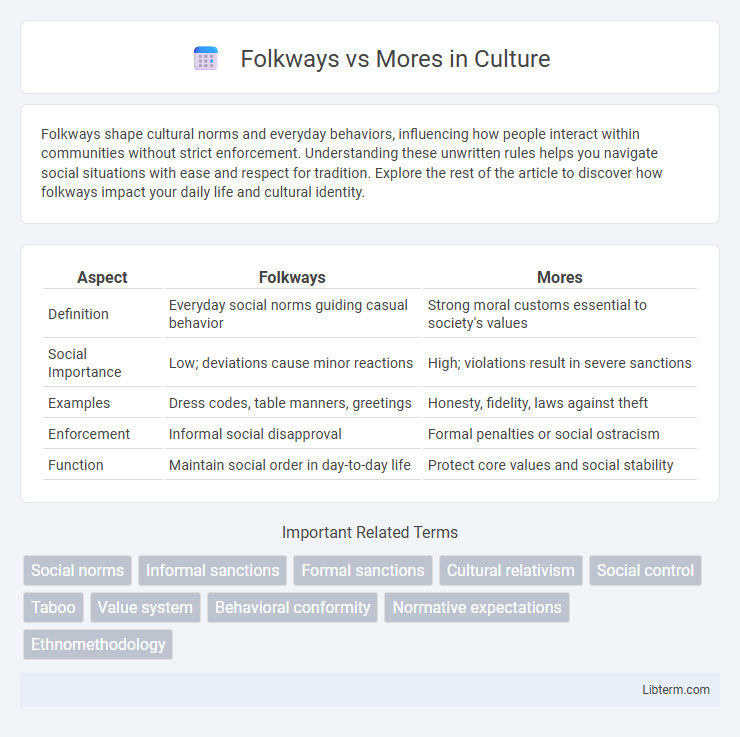Folkways shape cultural norms and everyday behaviors, influencing how people interact within communities without strict enforcement. Understanding these unwritten rules helps you navigate social situations with ease and respect for tradition. Explore the rest of the article to discover how folkways impact your daily life and cultural identity.
Table of Comparison
| Aspect | Folkways | Mores |
|---|---|---|
| Definition | Everyday social norms guiding casual behavior | Strong moral customs essential to society's values |
| Social Importance | Low; deviations cause minor reactions | High; violations result in severe sanctions |
| Examples | Dress codes, table manners, greetings | Honesty, fidelity, laws against theft |
| Enforcement | Informal social disapproval | Formal penalties or social ostracism |
| Function | Maintain social order in day-to-day life | Protect core values and social stability |
Understanding Folkways and Mores: Key Concepts
Folkways are informal norms that govern everyday behavior and social interactions, often rooted in tradition and cultural practices. Mores represent strong social norms central to a society's moral framework, with violations often resulting in severe sanctions or social ostracism. Understanding these key concepts highlights how folkways shape routine conduct, while mores enforce fundamental societal values and ethical standards.
Historical Origins of Folkways and Mores
Folkways and mores have distinct historical origins rooted in the development of social norms and cultural practices. Folkways emerged from everyday customs and habitual behaviors that maintained social order in early agrarian societies, reflecting informal traditions without strict enforcement. Mores originated from moral codes and collective values vital for societal cohesion, often linked to religious or legal principles that regulated more serious conduct.
Defining Characteristics of Folkways
Folkways are informal social norms that govern everyday behavior and ensure smooth social interactions without strict enforcement or severe punishment. They reflect customary practices such as etiquette, dress codes, and manners, which society accepts as typical conduct but does not legally mandate. Unlike mores, folkways are flexible and their violation usually results in mild social disapproval rather than serious consequences.
Core Features of Mores
Mores are social norms that embody the core values and moral principles of a society, enforcing strict conformity through strong social sanctions for violations. Unlike folkways, which regulate everyday behavior and customs, mores govern behaviors deemed essential for maintaining social order and ethical standards. Breaching mores often results in severe consequences such as legal penalties or social ostracism, reflecting their fundamental role in shaping societal cohesion and moral conduct.
Examples of Folkways in Everyday Life
Folkways are informal social norms that guide everyday behavior, such as dress codes, table manners, and greetings like shaking hands or saying "please" and "thank you." These customs, like standing in line or using polite language, help maintain social order without severe consequences for violations. In contrast to mores, which are strict moral norms, folkways primarily regulate routine interactions and cultural practices.
Real-World Illustrations of Mores
Mores are social norms that embody the moral views and principles of a group, such as laws against theft and murder that maintain social order and protect individuals' rights. Real-world illustrations include prohibitions on incest and cannibalism, which are universally condemned and often legally enforced to uphold societal values. Violations of mores result in severe consequences like legal penalties or social ostracism, distinguishing them from folkways, which involve everyday customs with milder repercussions.
The Social Functions of Folkways and Mores
Folkways regulate everyday behaviors and promote social order by encouraging conformity to routine customs, such as dress codes or dining etiquette, which help maintain smooth interpersonal interactions. Mores, reflecting core societal values, enforce moral standards through stronger sanctions and guide behaviors essential for social cohesion, like honesty and respect for life. Together, folkways and mores function to stabilize society by distinguishing acceptable conduct and preserving cultural norms.
Consequences of Violating Folkways vs Mores
Violating folkways typically results in mild social disapproval or informal sanctions such as ridicule or exclusion from casual groups, reflecting their role in everyday social etiquette. In contrast, violating mores leads to severe consequences including formal punishment, legal penalties, or social ostracism due to their basis in moral and ethical standards fundamental to a society's core values. The distinction underscores how mores enforce critical norms essential for social order, while folkways guide routine social interactions.
Folkways vs Mores: Cultural Variations
Folkways are everyday social norms guiding routine behaviors, while mores represent deeply held moral standards within a culture. Cultural variations in folkways reflect differing customs and traditions, such as dining etiquette or dress codes, which may be flexible and evolve over time. Mores hold stronger societal significance across cultures, often dictating laws and ethical boundaries, with violations leading to social sanctions or legal consequences.
The Evolving Nature of Folkways and Mores in Modern Society
Folkways and mores evolve as societal values and norms shift in response to cultural, technological, and generational changes. In modern society, folkways such as dress codes and casual greetings adapt rapidly to global influences and digital communication trends. Mores, reflecting deeper moral imperatives like honesty and justice, also undergo transformation but at a slower pace, often influenced by legal reforms and ongoing ethical debates.
Folkways Infographic

 libterm.com
libterm.com